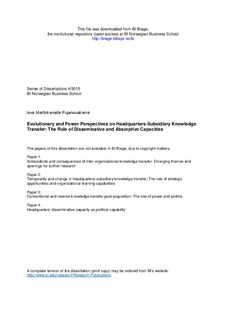Evolutionary and power perspectives on headquarters-subsidiary knowledge transfer: The role of disseminative and absorptive capacities
Doctoral thesis
Permanent lenke
http://hdl.handle.net/11250/284434Utgivelsesdato
2015-06-02Metadata
Vis full innførselSamlinger
Sammendrag
Through longitudinal case studies of headquarters-subsidiary knowledge transfer, I explore knowledge sender and receiver capabilities, and the underlying micro-mechanisms that have implications on knowledge transfer processes and outcomes over time. The knowledge transfer phenomenon between parent firm headquarters (HQ) and subsidiaries has received a substantial amount of research attention over the last decades. Even so, knowledge of firms’ disseminative and absorptive capacities and the mechanisms through which they interact and shape knowledge transfer is lacking. This doctoral thesis aims to contribute to our understanding of the strategic, relational and political nature of sender and receiver capabilities, and their implications on HQ-subsidiary knowledge transfer in multinational corporations (MNC).
This thesis consists of four research papers and their findings point to evolutionary dynamics of HQ-subsidiary knowledge transfer where power and politics play an important role. Most studies have looked at MNC knowledge transfer processes at one point in time. Using a longitudinal case study design, I find that the amounts and the types of transferred knowledge change over time. Headquarters-subsidiary knowledge flows vary with strategic opportunities, but also with changing abilities and motivations to disseminate and absorb knowledge. Whereas most studies of MNC knowledge transfer focus on the recipient, I demonstrate that sender-receiver interactions matter, and explain how these interactions influence HQ-subsidiary knowledge transfer processes and outcomes over time.
I studied the headquarters-subsidiary knowledge transfer processes in the context of post-acquisition integration where power and politics play an important role. My data shows that power imbalance between parent firms and their newly acquired targets influence the type, the timing and the amount of knowledge transfer through power balancing actions. Political strategies and influence tactics of the acquiring and target firms differ in conventional (acquirer to target) and reverse (target to acquirer) knowledge flows, and generate distinct knowledge outcomes. In this thesis, I develop a new conceptualization of headquarters’ disseminative capacity that refers to political capability of the parent firm to influence change in the behavior and attitudes of the subsidiary and, ultimately, gain and preserve power. This constitutes a novel way of looking at the headquarters’ role in intra-MNC knowledge flows through which a competitive advantage can be gained and sustained.
